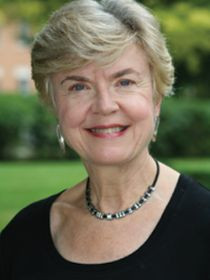
Fay Lomax Cook
Distinguished Senior Fellow, National Academy of Social Insurance
Professor Emerita of Human Development and Social Policy, Northwestern University
Chapter Member: Chicagoland SSN
Areas of Expertise:
Connect with Fay
About Fay
Cook’s research focuses on the dynamics of public opinion; Social Security; energy policy; the politics of public policy; and public deliberation. Her research addresses questions about what the public thinks about policy issues, how the public’s views have changed over time, why they have changed, and what difference it makes. She directs the Institute for Policy Research, an interdisciplinary research institute whose mission is to stimulate and support excellent social science research on significant public policy issues and to disseminate the findings widely.
Contributions
What Americans Think about the Future of Social Security
Key Findings Brief,
In the News
Opinion: "Why the Wealth Gap between Congress and Voters Matters," Fay Lomax Cook (with ), The Atlantic, December 27, 2011.
Opinion: "The Politics of the Top 1 Percent," Fay Lomax Cook (with ), The New York Times, December 14, 2011.
Publications
"Trusting What You Know: Information, Knowledge, and Confidence in Social Security" (with ). Journal of Politics 72, no. 2 (2010): 1-16.
Information matters. The Social Security Personal Statement mailed to people from the Social Security Administration increases knowledge and confidence in Social Security. Whether Americans understand and support programs depends on the quality and quantity of information they receive about them.
"Talking Together: Public Deliberation and Political Participation in America " (with ) (University of Chicago Press, 2009).
In settings ranging from one-on-one conversations to e-mail exchanges to larger and more formal social gatherings, eight out of ten Americans regularly participate in public discussions about such important policy issues as Social Security, economic development, and race relations. Engaging in deliberative gatherings can result in gains in knowledge, thus increasing citizen competence, and can prompt participants to increase their subsequent engagement in civic activities, contacting policymakers, and voting.
"Public Opinion and Social Insurance: The American Experience" (with ), in Social Insurance and Social Justice: Social Security, Medicare, and the Campaign against Entitlements, edited by Leah Rogne, Carroll Estes, Brian Grossman, Brooke Hollister, and Erica Solway (Springer Publishing Company, 2009), 250-278.
Public support for Social Security and Medicare rests on two pillars of public opinion – a belief in the core purpose of the programs and a belief that the programs are affordable public expenditures. Using data from dozens of public opinion surveys over the last 30 years, this paper shows that support for both Social Security and Medicare has remained strong over the past 30 years but confidence in the financial future of the two programs has grown weaker.
"Public Opinion on Energy Policy: 1974-2006" (with ). Public Opinion Quarterly 72 (2008): 364-388.
An analysis of trends in public opinion since 1974 on traditional energy sources, alternative energy sources, and citizens’ priorities on energy alternatives shows that Americans are concerned about the U.S. energy situation and are increasingly receptive to alternative sources of energy. They support policy changes that involve the government encouraging conservation through energy efficient appliances, vehicles, and homes and offices.